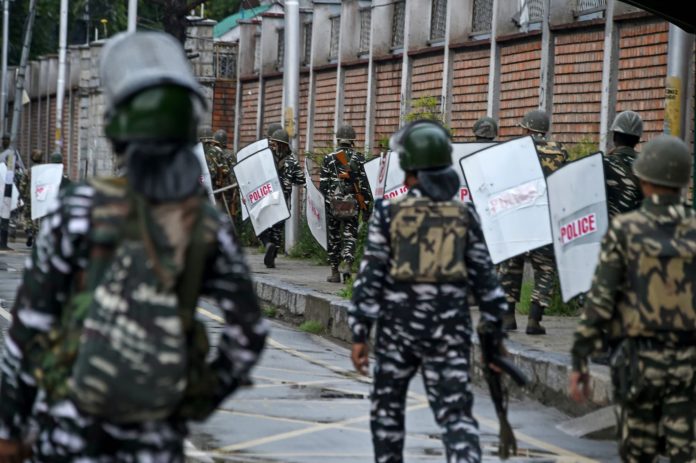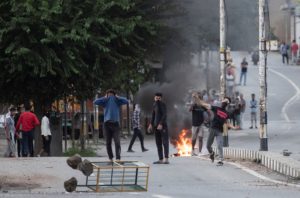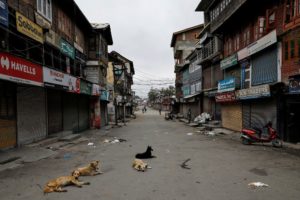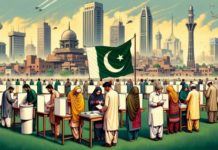
The Indian revocation of the special status of occupied Jammu & Kashmir has shut down almost all prospects for it to resolve the issue through dialogue, either with the Kashmiri leadership or with Pakistan. One wonders if India did not have any alternatives other than what it has already demonstrated in the form of strict security measures,Human Rights violations, communication blackouts, and draconian administrative measures to run the affairs of J&K.
Indian-occupied Kashmir has been under lockdown since August 4, with freedom of movement restricted. PM Modi believes that the decision is one of several “path-breaking” moves by his newly re-elected administration.
Every human rights activist recalls with joy and satisfaction the victories scored by ordinary people across the world in their struggles to secure their human rights. These rights thus won have included freedom from colonial rule; freedom from fear and hunger; freedom from discrimination on the grounds of belief, race, color, gender or social status; the right of every people to decide their own destiny; the right to self-governance; the right to own and dispose of resources; and above all, the right to peace.
But there have been situations when the international community and its human rights movement have failed to protect under any law the human rights of people who rebel against tyranny and oppression as a very last resort. The Kashmiri people’s rebellion against tyranny is one of the major cases that raises doubts in the minds of human rights activists regarding whether the slogans about the universality and indivisibility of human rights are valid for all vulnerable segments of humankind.
For several decades, the people of India-held Kashmir have been in a state of rebellion against tyranny and oppression, but the world has failed to ensure protection of their human rights under any law — national or international.
The international community’s failure to help the people of Kashmir has emboldened the Narendra Modi government to surpass all its predecessors in the use of naked force and various other forms of coercion to suppress their struggle for basic human rights. In addition to killing Kashmiri demonstrators by gunfire and torture in the security forces’ illegal cells, pellet guns have been used to blind children. Now cluster bombs are being used to terrorise the unarmed youth. An indefinite curfew in Srinagar and elsewhere has meant the whole population is starved and denied access to medical aid.
Can the international community deny that the people of Kashmir are fighting for their most fundamental human rights: the right to self-determination and freedom from tyranny and oppression? How can the international community ignore the fact that changes in Kashmir’s status introduced by the racist regime in New Delhi are aimed at helping its business elite gobble up Kashmir’s land and forests and thus deprive the Kashmiri people of the ownership of their natural resources?
The story of Israel’s expansionist designs — supported by the capitalist powers — is known to every student of history. The Zionist state has been allowed, nay helped, by its patrons to not only get away with its fruits of aggression, but also alter the status of Jerusalem. The way the demography of occupied Arab lands has been (and is being) changed is one of the earliest cases that caused frustration among human rights activists. The lesson is that big powers’ interest overrides their professions of support to human rights.

Recall the big powers’ refusal to support the black South Africans’ fight against apartheid. Those who rebelled against tyranny received no sympathy. Instead, they were jailed under the Suppression of Communism Act, and the campaign against communism allowed no respect for human rights. The Third World plea for sanctions against South Africa’s racist rulers remained unheeded. The lesson was clear: big powers’ partners at the global level were free to abuse human rights.
Myanmar’s atrocities against the Rohingya and the world’s failure to protect their rights are fresh in our minds. The human rights of the resource less Rohingya were overlooked because certain big powers and some smaller fry had business relations with the regime.
Thus, it is possible that the leaders of the international community are so obsessed with ideas of profiting from relations with India that Modi can blackmail them into looking away from Kashmir.
It is also possible that the Kashmiris are not considered entitled to international support because their cause has been taken up by Pakistan that is still on FATF’s grey list, and the international jury is biased against it. But Pakistan’s interest in the unfinished Partition agenda, or the history of India-Pakistan wrangling including wars between them, cannot affect the just cause of the Kashmiri people. It would be a horrible miscarriage of justice if the people of Kashmir were denied their human rights only because the leaders of world opinion do not like their counsel.
Another reason for the world’s indifference towards the Kashmiri people’s plight could be the fallout of what is described as Islamophobia. While there may still be elements among the Kashmiri freedom fighters who base their politics on their religious identity, most of them gave up faith-based politics long ago. Now the change in Kashmir’s status undermines the rights and interests of all Kashmiri people and the division into religious groups created by inept rulers is crumbling as New Delhi faces a surge in Kashmiri nationalism.
Finally, international support to the Modi government’s operations in Kashmir amounts to legitimising genocide as a means of achieving political gains, a trend the entire human family must repel with its fullest force.

After doing away with Kashmir’s autonomous status against the spirit of article 370 of the Indian constitution Narendra Modi must have thought that he had unilaterally solved the festering Kashmir problem. But it is not that simple.
Despite the change of status of occupied Kashmir, one has witnessed a callous indifference of the world at large and of Muslim Ummah, in particular, to the plight of Kashmiris who have been subjected to an inhuman treatment by the Indian occupation forces.
https://www.dawn.com/news/1499965/oic-asks-india-to-immediately-lift-kashmir-curfew
Washington said ‘India calls these actions internal matter’ without bothering to mention Pakistan’s position. Washington further ‘urged India to engage in discussions with those affected by its decision’ again ignoring Pakistan’s position.
This shows complete failure of Pakistan’s diplomacy infested with political appointees and incompetence.
The prime minister has rightly registered his strong reaction by sending back the Indian ambassador to New Delhi. Pakistan can further highlight the issue by closing its air space to all flights coming from the east. This will be justified in the presence of India’s military build-up along the international and along the line of control.
According to UN resolutions, Pakistan, Kashmiri people, and India are three parties to the conflict. But India unilaterally withdrew its special status.
India Revokes Occupied Kashmir’s Special Status
At the moment, Kashmir is the world’s largest detention centre where the Internet and other communication facilities have been shut down. Even basic necessities are not found because of the deteriorating law and order situation.
The Kashmiri Muslims should be given the opportunity of self-determination instead of hollow dreams by the Indian government.







